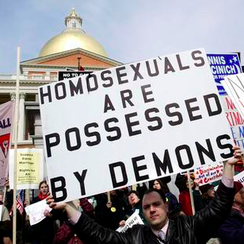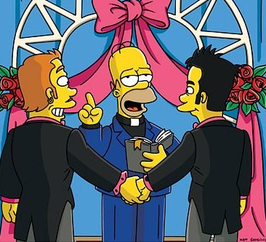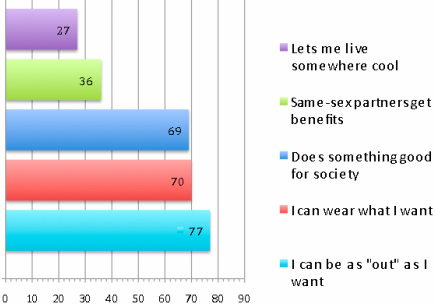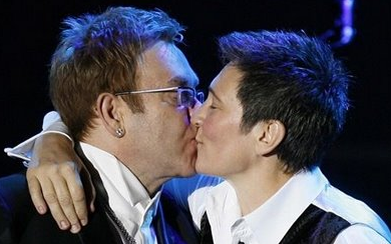|
Here's the first installment of my "butches and jobs" series. As regular readers know, last week I posted a survey asking butch readers about their job search histories. I got a big response--well over 200 readers filled out the whole thing (thanks!). Unsurprisingly, my youngest readers didn't fill it out (since most of them don't have work histories yet). But aside from this, there was a fairly widespread representation of ages. See? Okay, admittedly that pie chart is a little gratuitous. But it was my practice for using Word to make charts, and I was too delighted with myself for having done this not to share it. Pretty colors! Wheeee! Ahem. So as you might remember, I asked about what factors "affect" you when you're looking for a job. You could choose as many as you want, or none at all. The job characteristics I listed were: helps society, lets me wear what I want, gives benefits to my partner, lets me live somewhere cool, and lets me be as "out" as I want. They're shown by percentage (in ascending order): I thought these results were pretty interesting. Maybe the most interesting to me was "I can wear what I want." Seven out of ten of us are affected by this. Maybe if we polled straight people, some of them would be affected by the ability to wear what they wanted on the job, too, but I highly doubt it would be 70%! It's depressing that this is a factor so many of us have to consider. But to me, this really underscores the idea that self-presentation, particularly when it comes to clothing choices, is at the core of who we are and what allows us to be ourselves. Can I be "me" in a skirt suit? Not easily.
I was a little surprised that partner benefits were so low on the list--only 36%. Maybe this is because a lot of you don't have partners, or have partners whose workplaces already provide insurance, or work in a field where benefits aren't typically available, or work in a country with universal health care. A few people wrote in the comments that regardless of whether their partners need health benefits, as a matter of principle they try not to work for companies who don't offer same-sex partner benefits. "I can be as 'out' as I want" topped the list--more than 3/4 of you are affected by the extent to which you can comfortably be out as LGBTQ at work. Not too surprising, since fewer than half of all states in the U.S. have protection for people who are fired because of sexual orientation. Some of you have experienced this. Here are a few quotes from the survey:
More to follow about butches and jobs in future posts. Happy Leap Year! (Oh--and a note to you statisticians out there: I'm fully aware that this isn't a random sample, that I haven't controlled for various factors, etc., etc. I'm not claiming scientific validity!)
6 Comments
_Just a quick note to (1) say Happy Leap Year, and (2) announce that Butch Wonders is a Finalist for About.com's Favorite Lesbian Blog Award! A huge thanks to everyone who nominated BW.
I hope you'll take a second to vote for Butch Wonders here. I'm in third place now. You can vote up to once per day. So vote early, and vote often! It's the 28th! Which means it's that special time of the month. You know what I mean, right? [WINK, WINK.] Yes! Time to: ...Pay the rent! ...Frontline the dog! ...And best of all, share with you all the weird-ass searches that got people to Butch Wonders! Here are some of my February favorites:
_
_
 Thanks for the info, random dude! Hi, friends! I learned from the picture at left that homosexuals are possessed by demons! How did I not know this? I hope my demon is friendly, tall, purple, and has the power to make me fly. I am going to name my gay demon Margie, because that seems like a particularly disarming name for a demon. What will you name yours? What magical powers does your gay demon have?  Do we want state involvement in this? How much? _Lately, I've been pondering the whole idea of marriage as a state creation, and the government's involvement in family structure. First, let me be clear: I'm just trying this argument on for size; I'm not entirely convinced it's right. But as a thought experiment, follow me down this road for a minute. Imagine that the government was no longer in the business of sanctioning any family structure at all. First, suppose that there was no such thing as state-sanctioned marriage. No tax benefits for being married, no deductions, no implications for social security credits. Instead, marriage would simply be something that people do privately to announce their commitment to their friends or their church or their family or their God. There would be no legal implications for this, only psychological and emotional ones. Taking the government out of our private lives would have implications for family structure, too. There wouldn't be tax deductions for having kids, for example. Why should the government give people a financial incentive to have a particular family structure?) Instead of making sure that your employer gives you leave if you have a child (biological, adopted, whatever), the government could make sure that everyone got a certain amount of leave time to do whatever they wanted. If you want to have a kid, great. If you want to write a novel or volunteer at the local animal shelter with that time instead, great. It's not that people with families would be "punished;" it's simply that family-related activities wouldn't be privileged over other activities. Similarly, the Family Medical Leave Act (FMLA) could still exist, but it wouldn't just be to take care of a family member. Instead, you could use it if you needed to take care of anyone who was sick, even a friend. I can imagine downsides to this approach, not to mention logistical difficulties associated with a lack of default rules about various matters (e.g., who can visit you in the hospital). Health insurance could be problematic, too (though, uh, if we gave everyone health care, this wouldn't be an issue...). But there's no reason we couldn't find solutions to these problems. Since, statistically speaking, most people benefit from the laws and policies and practices that endorse particular family structures (and particular activities related to the creation and maintenance of these structures), I doubt that the government is likely to disentangle itself from these anytime soon. But when we talk about whether gay marriage is worth fighting for, I can't help but wonder if these fights are beyond the point. As long as marriage remains a government creature, I will remain fully dedicated to marriage equality. But maybe the real problem is that the government rewards and incentivizes particular ways of living over other ways, calling the structures it endorses "American values," and implicitly branding all others deviant. If this is so, it is a problem that goes well beyond gay and straight. I'll be interested to know what you think about all of this, dear readers. Should marriage be a government creature at all? At the very least, I think it's worth pondering. |
|





 RSS Feed
RSS Feed